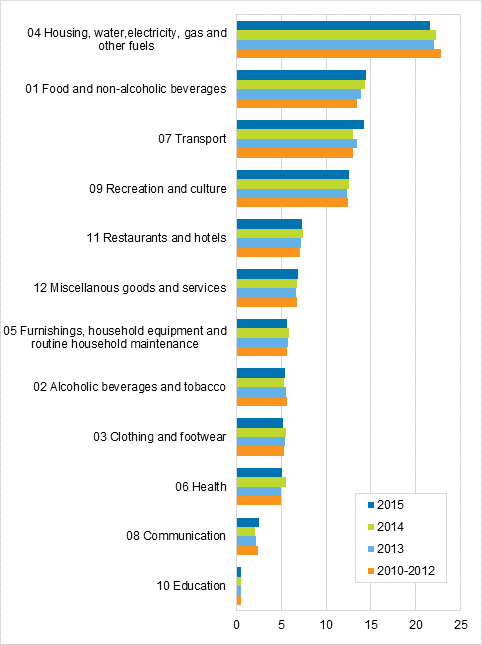The weight structure of The Consumer Price Index was updated
The weight structure of the Consumer Price Index is based on national accounts data. The data are updated annually. The weight structure for 2015 corresponds to the value of private consumption in 2014, which was EUR 94.6 billion. From EUR 56.5 billion of the base year 2000=100 index, private consumption has grown in nominal terms by nearly seventy, in real terms by a good thirty per cent.
The weights of the Consumer Price Index are composed of the value of goods and services bought by households in Finland. Households also include tourists and institutional households. The concept of private consumption in the Consumer Price Index differs from the concepts used in national accounts and the Household Budget Survey and its coverage is also different.
The price development of representative commodities is followed in the Index. With the help of annually updated commodities and weights, better representation of commodities in the Index is ensured. Previously, the weight structure of the Consumer Price Index was updated every five years. The last big scheduled update was made at the beginning of 2011, when a larger proportion of commodities was changed. No changes were made to the 2015 commodity selection.
Figure 1. Comparison of the weight structures of Consumer Price Index 2010=100, per cent

The largest change in the weight structure of the index from the previous year was the increased share of transport. Changes in the prices of commodities in this group have now more effect on the Consumer Price Index than before. Correspondingly, as a result of the drop in the weight share of commodities related to housing, the changes in these prices have less effect on changes in the consumer price index.
The base year of the Harmonised Index of Consumer prices remained unchanged
Statistics Finland has also revised the weight structure of the Harmonised Index of Consumer Prices calculated for Eurostat, the Statistical Office of the European Communities. The year 2005 remains as its base year.
The Harmonised Indices of Consumer Prices are primarily used in price comparisons between the EU countries. The European Central Bank uses the Harmonised Index of Consumer Prices as the measure of inflation in its monetary policy.
The Harmonised index of Consumer Prices is based on the same weight and price data as the national Consumer Price Index, but its commodity selection is narrower: it excludes owner-occupancy, games of chance, interests and tax-like payments. The Harmonised Index of Consumer Prices covers under 90 per cent of the national Consumer Price Index.
Table 1. Consumption items removed from the Harmonised Index of Consumer Prices and their weights in the Consumer Price Index 2010=100 year 2015
| COICOP | Commodity/group | Weight in the CPI, o/o |
| 04.2 | Owner-occupied housing | 7.09 |
| 07.2.4.2.1.1 | Vehicle tax | 0.97 |
| 09.4.3.1.1.1 | Games of chance | 1.99 |
| 12.5.2.1.1.2 | Premium for fire insurance on detached houses | 0.07 |
| 12.6.2.1.1.2 | Interests on consumer credits | 1.01 |
| Items removed from HICP, total | 11.13 | |
Source: Consumer Price Index, Statistics Finland
Inquiries: Ilkka Lehtinen 029 551 3478, Kristiina Nieminen 029 551 2957, khi@stat.fi
Director in charge: Leena Storgårds
Updated 19.2.2015
Official Statistics of Finland (OSF):
Consumer price index [e-publication].
ISSN=1799-0254. January 2015,
The weight structure of The Consumer Price Index was updated
. Helsinki: Statistics Finland [referred: 26.4.2025].
Access method: http://stat.fi/til/khi/2015/01/khi_2015_01_2015-02-19_kat_001_en.html

